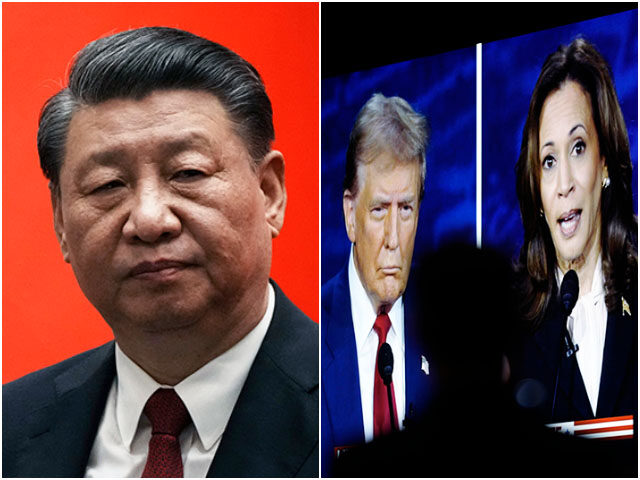The Chinese Foreign Ministry bristled on Wednesday at being asked about the presidential debate between Vice President Kamala Harris and former President Donald Trump, which took place Tuesday, insisting it does not want China to be “an issue” in the election.
Harris and Trump squared off in a debate hosted by ABC News. Despite the debate featuring a significant amount of foreign policy content and China presenting America’s most dangerous geopolitical threat, moderators David Muir and Linsey Davis did not ask a single question about China. The Communist Party regime only surfaced as a topic in isolated parts of the conversation when Trump or Harris mentioned it.
Trump and Harris engaged in a small exchange on Trump’s decision to impose tariffs on Chinese imports, which the Agence France-Presse (AFP) raised during the Chinese Foreign Ministry’s regular press briefing on Wednesday. Spokeswoman Mao Ning refused to address the exchange, insisting, “The presidential elections are the United States’ own affairs. We have no comment on that.”
“That said, we are opposed to making China an issue in US elections,” she added.
The Global Times, China’s top state-run English propaganda newspaper, complained on Thursday – in a different context, the Congressional “China Week” event to discuss Beijing’s threat – that Washington’s relationship to the genocidal Chinese regime was causing so much concern in America. Rather than threat China’s belligerence towards American and the free world generally as a legitimate political issue, the Times dismissed it as a perennial distraction American politicians use to keep the focus away from domestic U.S. issues.
“When it comes to China, politicians from both parties line up one after another to affirm their contention that China is dangerous and poses a real threat to the US and to the world. Dubious legislation follows,” the Times huffed.
“The political discourse in the US when it comes to China lacks common sense, and the more mainstream media attention it gets, the more damage it does to public opinion across the country,” the state newspaper complained. “Regardless of who wins the presidential election in November, there is no reason to expect a change in the rhetoric or its vicious tone.”
Despite the outsized threat communist China presents to American interests – and its long record of human rights abuses, its ongoing colonization of Africa, and its close ties to American enemies such as Russia and Iran – Trump and Harris did not have to answer any questions about China on Tuesday. Indicating the extent to which China looms over so many other political issues in America, Washington’s policies towards China came up, anyway, particularly during a segment on economic policy.
Harris used her time to attack Trump’s approach to China, accusing him of inviting “trade wars” and empowering the Chinese military.
“He invited trade wars — you want to talk about his deal with China?” Harris said. “What he ended up doing is, under Donald Trump’s presidency, he ended up selling American chips to China to help them improve and modernize their military — basically sold us out when a policy about China should be in making sure the United States of America wins the competition for the 21st century.”
In reality, the Trump administration significantly limited American exports of chips and semiconductors to China and more fervently targeted Chinese companies known to be a national security risk, such as the telecommunications corporation Huawei, in its limitations. In 2021, Reuters reported that the Biden-Harris administration “has granted licenses authorizing suppliers to sell chips to Huawei for such vehicle components as video screens and sensors.”
China has become America’s top technological ally. A study published by the Australian Strategic Policy Institute (ASPI) think tank in August found that China has become the world leader in nearly 90 percent of technologies considered critical for future development, having “effectively switched places” with America for the top spot in the past two decades.
Intellectual property theft played a major role in achieving this leadership, as well as espionage, forced technology transfers, and other illicit behavior. In 2019, FBI Director Christopher Wray revealed that the agency had over 1,000 investigations open into cases of Chinese intellectual property theft.
“There is no country that poses a more severe counterintelligence threat to this country right now than China,” he warned. “It is a threat that’s deep and diverse and wide and vexing. It affects basically every industry in this country.”
A 2022 study by the Boston firm Cybereason found that China had used hackers to steal hundreds of gigabytes of high-tech intellectual property from as many as 30 multinational corporations, including American companies.
China is also working to supplant America as a diplomatic power, using major conflicts such as the Israel-Hamas war and the Russian invasion of Ukraine to present itself as a worthy potential mediator. Its allies are helping elevate its profile – Moscow suggested this week that the Chinese government could take a major role in helping resolve its conflict with Ukraine, likely helping Russia cement control of the Ukrainian territories it has colonized since 2022. In the Middle East, China has invited Hamas terrorists to Beijing to discuss mending fences with the Palestinian Authority and regularly berates Israel to end its self-defense operations against Hamas in Gaza, to the applause of Israel’s hostile Muslim neighbors.
Follow Frances Martel on Facebook and Twitter.

COMMENTS
Please let us know if you're having issues with commenting.